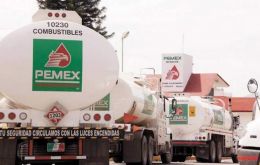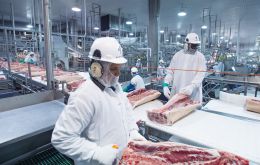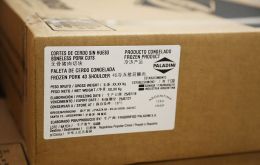MercoPress. South Atlantic News Agency
Economy
-
Saturday, November 23rd 2019 - 09:33 UTC
Swiss investigation helps expose corruption network involving Vitol, Trafigura and Petrobras

Swiss investigators have executed search warrants at addresses linked to Vitol and Trafigura, their counterparts in Brazil said on Thursday, as a sprawling probe into the global commodity trading industry intensifies.
-
Saturday, November 23rd 2019 - 09:04 UTC
Mexico's giant Pemex, remains world's most indebted oil company

A Mexican government energy policy that gives more weight to state oil company Pemex could cause private sector investment to fall, an analyst with credit ratings agency Standard & Poor’s said on Friday.
-
Friday, November 22nd 2019 - 09:46 UTC
China buying all Brazilian beef available; meat prices in Sao Paulo at record high

Chinese demand is increasingly swallowing up Brazil's beef supply, pushing the country's cattle prices to a record high. China’s hunger for foreign meat has shot up as an outbreak of African swine fever has reduced its domestic pig population and has sent it looking for substitutes.
-
Friday, November 22nd 2019 - 09:43 UTC
Argentine send first shipment of chilled pork for China

Argentina has sent its first shipment of chilled pork to China, the government announced, as China's pork imports rise due to a devastating outbreak of African swine fever at home.
-
Friday, November 22nd 2019 - 09:11 UTC
US Congress wants to investigate Brazil's meatpacking giant JBS

A top United States Democratic congresswoman on Thursday asked the Agriculture Department (USDA) to investigate and retract tens of millions of dollars in federal contracts with the U.S. subsidiary of a Brazilian meatpacking company facing federal corruption charges.
-
Thursday, November 21st 2019 - 09:55 UTC
Falklands celebrates “touchdown for the Second Flight” and anticipates a new era of development for the Islands

The elected government of the Falkland Islands announced that a new era has opened Islands with the inaugural Second Flight from São Paulo, Brazil, touching down this Wednesday afternoon at Mount Pleasant Airport.
-
Thursday, November 21st 2019 - 09:21 UTC
Fed dismisses the idea of negative interest rates, despite Trump's insistence, according to released minutes

US central bankers last month dismissed the idea of taking interest rates into negative territory, something President Donald Trump has called for many times, according to meeting minutes released on Wednesday.
-
Wednesday, November 20th 2019 - 09:59 UTC
Judge ratifies Wednesday's air link between Sao Paulo and Malvinas/Falklands

Argentine federal judge Luis Rodriguez ratified on Tuesday the green light for Latam's flight, beginning this Wednesday, linking Sao Paulo in Brazil and Cordoba with the Falkland/Malvinas Islands, after throwing out a request to suspend the link.
-
Wednesday, November 20th 2019 - 09:56 UTC
Fernandez tells IMF, “we want to make a commitment that we can keep”

Argentina’s president-elect, Alberto Fernandez, has a “sustainable” plan to meet creditor obligations as well as maintain growth, he told the International Monetary Fund´s managing director Kristalina Georgieva, his office said.
-
Wednesday, November 20th 2019 - 09:55 UTC
Brazil's Real depreciating against the US dollar, but inflation remains below target

Brazil’s Real is sliding toward an all-time low against the U.S. dollar, but the central bank appears in no rush to intervene to slow or even reverse the fall. Despite the Real’s historical weakness, the market is functioning smoothly: depreciation, so far, has been fairly orderly, volatility is low, liquidity has not dried up, and the Real is not the only emerging market currency under pressure.
